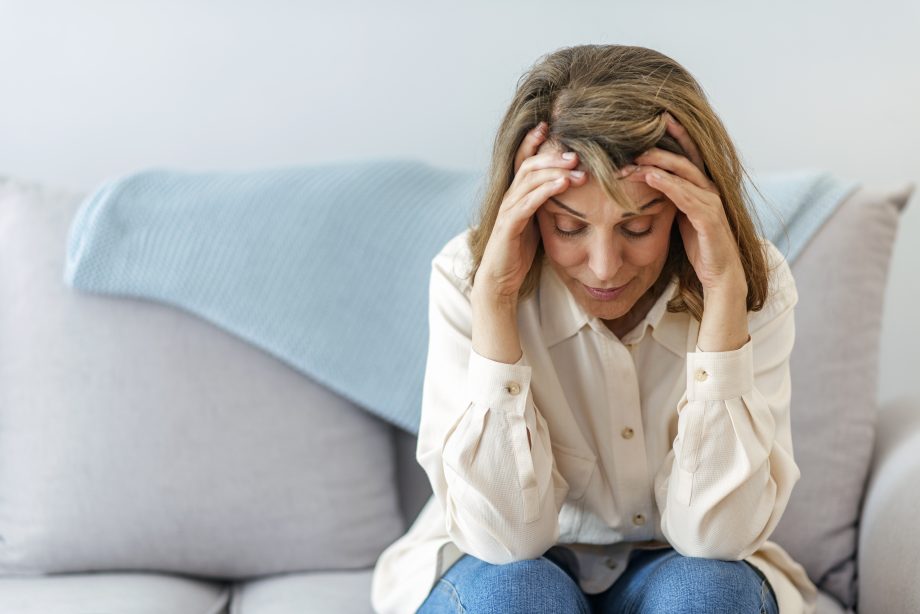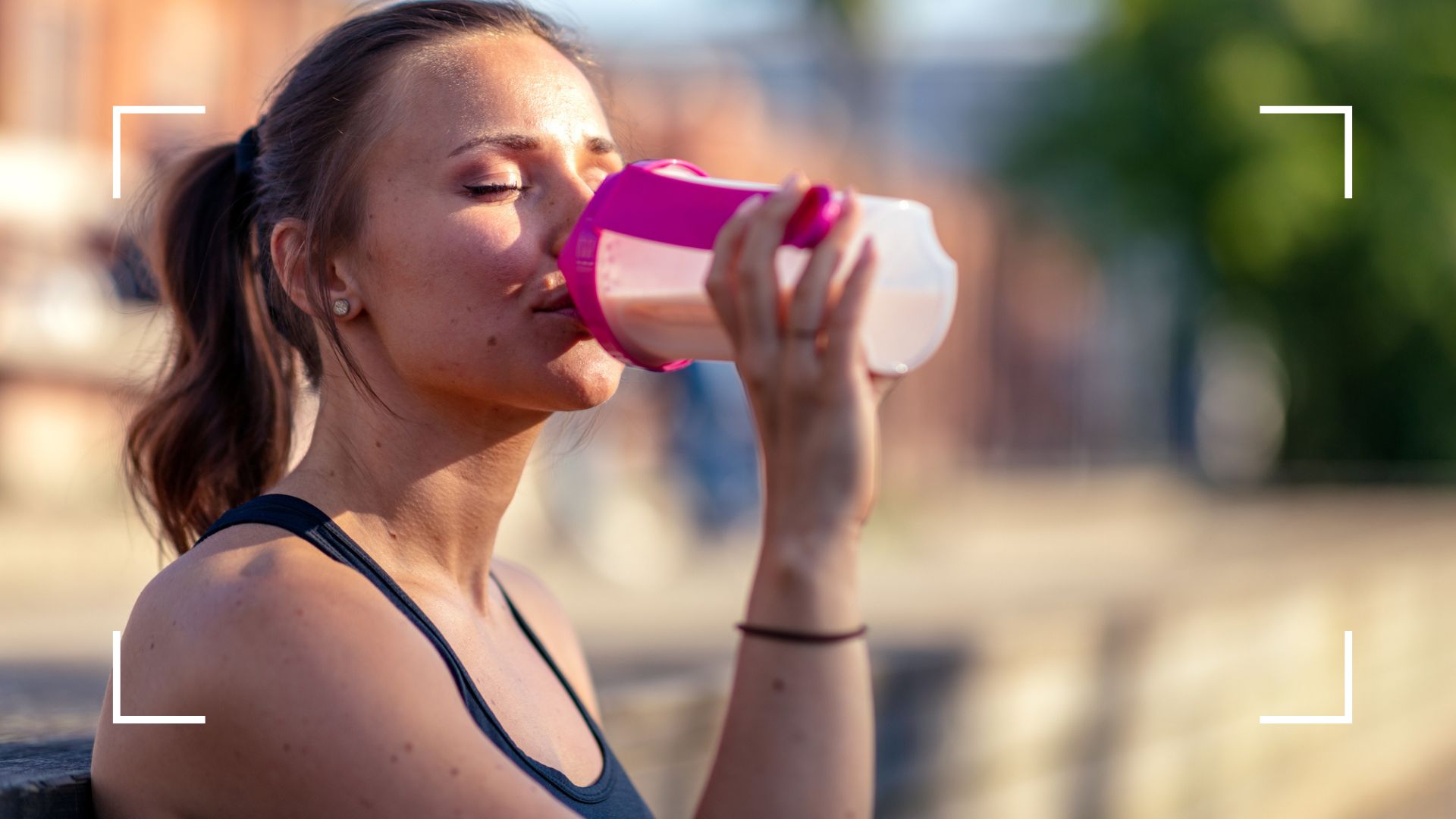Menopausal women are being wrongly prescribed antidepressants: 'Quite frankly, insulting'
A third of women are being prescribed antidepressants by their GP to combat symptoms of the menopause, according to new research.


Currently, around 3.4 million women in the UK between the ages of 50 and 64 are experiencing menopausal symptoms, according to Dr Haitham Hamoda, chairman of the British Menopause Society.
Eight out of ten women experience physical or emotional menopausal symptoms during the time before and after their periods stop – including hot flushes, night sweats, mood swings and memory loss.
According to a newsurvey carried out by nutritionist, and founder of the Women's Nutritional Advisory Service, Maryon Stewart, women going through the menopause are being incorrectly prescribed antidepressants to combat their menopausal symptoms.
The survey found over a third of menopausal women approaching their GP about symptoms and are being offered antidepressants. Worryingly, 80% of these menopausal women said antidepressants were an “inappropriate” treatment for their menopausal symptoms.
"Women going through the menopause are not mentally ill, antidepressants are not appropriate.”
The What Women Want at Menopause survey also revealed 84% of women felt their GP did not fully address their questions about the menopause. Shockingly, only three in 10 of women felt their doctor had been helpful regarding menopause.
Maryonsaid the number of menopausal women wrongly antidepressants is “worrying on a number of levels” and “quite frankly, insulting".
Sign up for the woman&home newsletter
Sign up to our free daily email for the latest royal and entertainment news, interesting opinion, expert advice on styling and beauty trends, and no-nonsense guides to the health and wellness questions you want answered.
“It is not a solution, it is not going to help their self-esteem or their relationships. In some cases, it can make them feel worse. We are constantly inundated with women who are suffering unbelievably who are not getting any effective help. They are not mentally ill, antidepressants are not appropriate.”

This isn’t the first study that has come to the conclusion that antidepressants are wrongly prescribed to menopausal women. Anotherstudy conducted by GP and menopause specialist, Dr Louise Newson, of nearly 3,000 women found that 66% of the women surveyed had been inappropriately offered or given antidepressants for the low mood associated with their menopause.
Diane Danzebrink, a member of The British Menopause Society said, "The key point here is that the psychological symptoms of the menopause are being misdiagnosed as women receive no information about menopause before it comes along and many health care professionals simply do not have adequate knowledge due to a lack of education."
"Antidepressants helped with sleep, but little else. Feel rather angry about time I lost - and wrong information!”
Jayne Harrison was offered antidepressants for her menopause symptoms. But while she found the antidepressants helped her quality of sleep, they had little effect on other symptoms she was experiencing. Like many other women, Jayne felt she did not receive adequate information from her GP about all options available to her, including Hormone Replacement Therapy (HRT).
MORE:HRT: essential reading on the side effects, benefits and risks of hormone replacement therapy
Jayne told us, “I was put on antidepressants for about two - three years with no mention of HRT. I was told I couldn't have HRT until I'd stopped having periods for over a year. I had to fight to get it in the end. Had a terrible time.
"Antidepressants helped with sleep, but little else. Feel rather angry about time I lost - and wrong information!”
Why are menopausal women being wrongly prescribed antidepressants?
Research has revealed that GPs have prescribedantidepressant drugs SSRIs (selective serotonin reuptake inhibitors) and SNRIs (serotonin and norepinephrine reuptake inhibitors) for menopausal women suffering with anxiety and depression.
MORE:How to combatdepression and anxiety andwhen you’re menopausal
Dr Anne Henderson, a British Menopause Society accredited specialist, believes that menopausal women are being wrongly prescribed antidepressants "due to a lack of formal training and education amongst GPs and gynaecologists".
She continued, "There is currently no mandatory requirement for any doctor to undergo formal training in menopause and HRT: hopefully this will change in the near future. Many GPs and gynaecologists are failing to follow the NICE clinic guidance menopause and HRT which was published in 2015.
"This guidance makes it crystal clear that SSRI antidepressants and other forms of psychoactive medications should not be the first line choice for treatment of mood disorders, anxiety and depression, during the peri-menopause and menopause. Instead, women should be offered HRT."
Maryon Stewart suggests the increase in number of menopausal women being prescribedantidepressants could be due to the recent HRT shortage.
MORE:We asked menopause experts about HRT alternatives following news of a national shortage
Maryon told The Independent, "If doctors can’t give HRT due to the shortage and it was previously in their tool bag for dealing with the menopause, they will be looking for other things to offer."
Due to supply issues and manufacturing shortages, HRT drugs have been increasingly hard to obtain.A recent survey found 84% of menopausal women could not get hold of their desired HRT drug, leading many turn to HRT alternatives.
Could antidepressants make menopausal symptoms worse?
Anne explains, "There is evidence that SSRI antidepressants can exacerbate some menopausal symptoms, particularly poor libido and weight gain, which are very common due to the hormonal shifts. They are also much less effective at controlling menopausal mood disorders than is generally recognised."
Diane agrees, "Many women say that antidepressants when prescribed for the psychological symptoms of menopause simply don’t help, or make them feel numb or flat."
"Antidepressants didn’t help at all they just made me feel a bit numb and slightly disconnected from everything."
Katie Taylor described her experience using antidepressants during the peri-menopause, she said, "I was offered antidepressants during the four years when I was suffering (unbeknown to me) with terrible peri-menopause symptoms, which were misdiagnosed as depression. Antidepressants didn’t help at all they just made me feel a bit numb and slightly disconnected from everything."
After visiting agynaecologist, Katie was diagnosed with peri-menopause and prescribed HRT. She said, "I was like a new woman and back to the old me within a month. I set up my online platform The Latte Lounge so that no other woman would waste good years of life trying to figure out what was wrong with them.”
There's also the added complication of when to come off the antidepressantspost-menopause.Anne Henderson said, "There is also increasing data which show that withdrawal from antidepressants is far more problematic than was previously realised, and can take considerably longer than expected."
Possible side effects of antidepressants
• Cardiovascular side effects and gastrointestinal side effects
• Nervousness, insomnia, restlessness and nausea
• Weight gain and headaches
• Dry mouth, nausea, constipation, diarrhoea and appetite problems
• Decreased libido, anorgasmia and decreased arousal
Is there any evidence to prove antidepressants are effective in treating the menopause?
Fiona Scott was prescribed antidepressants after suffering low moods during the menopause, and believes they have helped her manage her anxiety to some extent.
"I'm currently using anti-depressants for the first time - I'm 53 - to help with anxiety around certain things which my GP and I believe is related to menopause.
"I've been taking antidepressants for four months now and I do feel it's helping - while I'd rather do things naturally, nothing seemed to help in those moments which are illogical but feel very real. Now I almost feel if the anxiety rears its head, it's like I'm being 'pulled back' and that heightened feeling has had the edge taken off it."
Sue Flynn has had success using antidepressants to combat her hot flushes. She decided to start taking antidepressants, after previous cancer treatment left her unable to opt for HRT. Sue said, “I take Venlafaxine [an SSNRI antidepressant] for my very bad hot flushes. I can’t take HRT as I was treated for breast cancer four years ago. This put me in an early menopause at 48, which started the flushes.”
According to a clinical trial carried out in 2014, low doses of SSRIs or SNRIs may help reduce vasomotor symptoms, such as hot flushes and nightly sweats. Compared to placebo, antidepressants can help to reduce the frequency of vasomotor symptoms by 50%. Aclinical trial carried out 2015 found low doses of the SSRI paroxetine improved sleep quality in menopausal women. The study concluded that nighttime awakenings attributed to hot flushes were significantly reduced within 4 weeks of initiating paroxetine (a type of antidepressant).
Most anti-depressants prescribed to menopausal women are considered off-label use, meaning that vigorous tests proving their effectiveness have not yet been carried out in full.
And while women such as Fiona and Sue have experienced some benefits of taking antidepressants, according to theNICE menopause guidelinethere is no clear evidence that SSRIs or SNRIs ease low moods in menopausal women who have not been diagnosed with clinical depression.
The NICE guideline states, 'Do not routinely offer selective serotonin reuptake inhibitors (SSRIs), serotonin and norepinephrine reuptake inhibitors (SNRIs) or clonidine as first-line treatment for vasomotor symptoms alone.'

Sibelle Mehmet started as a junior digital writer at GoodtoKnow and Woman and Home in April 2019.
Prior to landing her first job as a digital writer, Sibelle completed an MA in Magazine Journalism at City, University of London and is also a graduate of the University of Edinburgh with an MA in English Literature and History.
As well as writing extensively about the latest celebrity, showbiz and royal news, Sibelle also covered a wide range of topics from trending beauty products to have on your radar, to the latest fashion styles compounded on the catwalk.
-
 Forget beach bags and sunnies, Jasmine Harman's ravishing red swimsuit was elevated by matchy-matchy lipstick
Forget beach bags and sunnies, Jasmine Harman's ravishing red swimsuit was elevated by matchy-matchy lipstickIf I want to make even the simplest outfit look a bit more polished, colour coordination becomes my style best friend.
By Emma Shacklock
-
 Lip contouring sounds a bit much, but this modern makeup technique is the 'soft' way to cheat a fuller pout
Lip contouring sounds a bit much, but this modern makeup technique is the 'soft' way to cheat a fuller poutThink about how you use your favourite bronzer, then apply the same principle to your lips - easy!
By Naomi Jamieson
-
 5 sexperts share their secrets to better sex for mature women
5 sexperts share their secrets to better sex for mature womenThese women know how to put the va-va-voom back into the bedroom… possibly even the kitchen! Here's what we've learned from them
By Kim Willis
-
 Can menopause cause a loss of taste and smell? Plus, 6 other signs of menopause you might not expect
Can menopause cause a loss of taste and smell? Plus, 6 other signs of menopause you might not expectCan menopause cause a loss of taste and smell? It's more than just colds and flu that can change our tastebuds
By Emily Smith
-
 The health benefits of protein powder for women, according to a nutritionist
The health benefits of protein powder for women, according to a nutritionistWe've got the scoop on the benefits of protein powder when it comes to your health
By Lucy Gornall
-
 Wondering if you're postmenopausal? These are 9 ways your body changes post-menopause
Wondering if you're postmenopausal? These are 9 ways your body changes post-menopauseThese are the body changes you can expect if you're postmenopausal
By Lauren Clark
-
 Can you get pregnant during perimenopause? Here’s how your fertility changes from your 40s
Can you get pregnant during perimenopause? Here’s how your fertility changes from your 40sIf you’re wondering can you get pregnant during perimenopause, we’ve got the expert verdict
By Lauren Clark
-
 What are the main menopause symptoms? Find out the signs and when to see your doctor
What are the main menopause symptoms? Find out the signs and when to see your doctorA team of experts outline common menopause symptoms and how to deal with them
By Stacey Carter
-
 Here's how to tell whether you're experiencing menopausal weight gain—and what to do about it
Here's how to tell whether you're experiencing menopausal weight gain—and what to do about itIf menopausal weight gain is knocking your confidence, this is everything you need to know...
By Lauren Clark
-
 How to calm down hot flushes if you are going through the menopause
How to calm down hot flushes if you are going through the menopauseHot flushes are thought to be caused by hormonal fluctuations—these are the best ways to ease them...
By Lauren Hughes